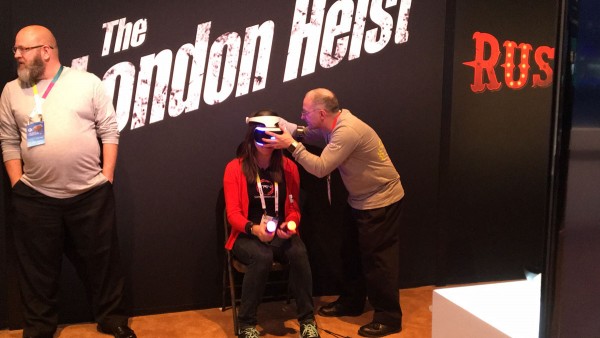
Jamie Feltham writes:
Virtual reality (VR) isn’t yet at a point where the technology is indistinguishable from real life, but it’s good enough to trick users into making human reactions
And he’s absolutely right. As it stands, when you put on something like PlayStation VR, though you’re transported to the middle of the game, it’s not as if you cannot distinguish between that and the real world. Despite that barrier (and one that we will cross sooner, rather than later as CPU/GPU performances continue to increase) the VR experience of today and the graphics that PS4 can pump out are more than adequate in helping create the illusion that what you’re experiencing is more than just a video game.
For example, jumping off a building in Uncharted or Assassin’s Creed wields a very different response than when jumping off of a building or being thrown out of a rollercoaster when a VR headset. Because of this, SCE Senior Designer Jed Asforth believes that:
It’s very important in VR that the player knows what they’re going to get.
After the jump, why framing virtual reality is very important to the overall experience.
Asforth continued:
If you get a new user going into VR the experience isn’t like a videogame, it’s like real life. With a lot of new users coming into VR they think ‘oh this is like real life’. However what we found is if you frame it like a videogame you get a different reaction
What Asforth is getting to is that for those who are new to gaming and VR, it’s quite important to let them know what they’re about to experience is a video game. With that piece of knowledge, the brain is suddenly willing to explore more avenues than if they believe the experience around them is mimicking real life. If we go back to the rollercoaster example, if you simply believe the VR experience is one that’s true to life, once tossed from your coaster, you’ll likely flail your arms around and prepare for the inventible impact on the ground.
However, the same demo, if framed in the context of video games, will lead you to try things you might not otherwise attempt – like fly or swing around like Spider-Man.
By setting those expectations then the players will have the right reactions and it won’t end up with taking the headset off and rejecting it
This is something that I had never thought about and the implications of it are huge. Within the right context, VR can be a powerful experience but if framed incorrectly, it can be quite disastrous. Imagine if someone’s first experience with VR was in a recreation of Resident Evil or Silent Hill. With the right knowledge, the entire thing can either be experienced as one terrifying event or one that’s open for exploration and adventure.
Discuss:
Do you think think the VR experience needs to be framed?
[Via VRFocus]

You must be logged in to post a comment.